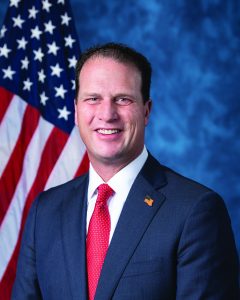
Congressman August Pfluger, State Sen. Kevin Sparks and the Permian Basin Petroleum, Texas Oil & Gas and Texas Independent Producers & Royalty Owners associations are incensed that the U.S. Fish & Wildlife Service has declared the Dunes Sagebrush Lizard an endangered species and wants to shut down production in nine counties of the Permian Basin.
With the feds thus far having been unable to take an accurate census of the skittish three-inch-long brown lizards, their population is estimated at 10,000 to 100,000.
Pfluger on Thursday introduced his Incredulous Zealots Against Restricting Drilling (LIZARD) Act, saying, “Listing the sagebrush lizard under the Endangered Species Act is an incredible threat to the production of the oil, natural gas, wind and solar energy developed in the Permian Basin.

“On the campaign trail, President Biden promised to kill the fossil fuel industry and that’s about the only promise we can count on him keeping,” the San Angelo Republican said from Washington. “Biden’s latest tactic, listing the Dunes Sagebrush Lizard as an endangered species so he can shut down drilling in the Permian, is just the latest in a string of assaults on the Permian Basin and our way of life.
“The President wants to control private property in Texas. Not on my watch. My legislation protects energy security and jobs in the Permian by nullifying his latest attack.”
As of Dec. 31, 2022, through state and private conservation efforts in New Mexico alone, Pfluger said,1,905,120 acres had been enrolled in a Candidate Conservation Agreement and Candidate Conservation Agreement with Assurances by the ranching community and 2,230,066 acres in the CCA and CCAA by the oil and gas industry to protect the Dunes Sagebrush Lizard.
“These enrollments have resulted in a net acreage conservation gain for the species’ habitat and associated financial contributions have helped fund dozens of reclamation and conservation programs to support the species while still affording the development of natural resources and human existence in the region,” he said.
The lizards’ habitat is in the counties of Andrews, Crane, Gaines, Ward and Winkler in Texas and Chaves, Eddy, Lea and Roosevelt in New Mexico.
Sparks said the FWS’s cynical pronouncement “is a clear case of federal regulatory overreach.

“The ESA was implemented in order to protect clearly endangered animals and to my knowledge there have been no conclusive studies that show that the Dunes Sage Brush Lizard has experienced any significant harm from the oil and gas industry in Texas,” said the Midland Republican who represents Ector County.
“I intend to submit a comment to the Environmental Protection Agency strongly opposing the adoption of this rule so that the unelected bureaucrats in Washington will have no excuse to say that they are unaware of the severe economic harm they are about to potentially inflict on countless oil and gas workers in my district, not to mention the significant inflationary impact this could have on all Americans as it would certainly have an effect on the global price of oil,” Sparks said.
“Washington continues to push radical climate initiatives at the expense of all citizens.”
PBPA President Ben Shepperd said the FWS’s action just before Fourth of July was unpatriotic.
“The day before Americans began the weekend celebration of our independence, the U.S. Fish and Wildlife Service announced that it would be proposing the listing of the Dunes Sagebrush Lizard as endangered under the Endangered Species Act,” Shepperd said. “Not only does this continue what has become a tradition of this administration, announcing major regulatory action on the eve of national holidays, it is once again an attack against American independence and the most prolific energy-producing region in the United States, the Permian Basin.

“Energy production in the Basin, which is a national leader not just in oil and natural gas production but also in wind and solar energy, provides energy independence to our nation. The listing of the Dunes Sagebrush Lizard under the Endangered Species Act when there has been such a tremendous state and private conservation initiative to protect the species and its habitat is a slap in the face not just to state and private conservationists but to all those around the world who rely on the energy produced in Southeast New Mexico and West Texas to provide a better quality of life.”
Shepperd said his organization “stands by the contributions and work put in by state and private participants to protect the species and believes further federal overreach and interference will only stand to harm the conservation work that has been done, not to mention the people and communities of the Permian Basin.
“We are disappointed but unsurprised that the U.S. Fish and Wildlife Service continues to serve as a tool for radical environmentalists and opponents of domestic energy production,” he said. “The Biden Administration continues to lament domestic energy production, regardless of the type, out of one side of their mouth while whispering directives to agencies to quash it on the other.
“We encourage congressional action just like Congressman Pfluger’s LIZARD Act to reform the Endangered Species Act to prevent its weaponization and encourage the voluntary plans that have proved to protect species and their habitat.”

TXOGA President Todd Staples said the energy industry “has been clear in demonstrating its continued commitment to sustained responsible development.
“Voluntary efforts have resulted in millions of dollars invested and countless hours of research aimed toward ensuring an appropriate balance between protecting the Dunes Sagebrush Lizard while responsibly growing jobs and our economy through the development of oil and natural gas,” Staples said from Austin.
“Positive, meaningful actions by industry and ranching are the most effective way to reach a balance that enables citizens to benefit from a growing economy and sound environment.”
TIPRO President Ed Longanecker said from Austin that the Texas oil and gas industry has worked with regulators, landowners and other stakeholders for over a decade to protect the lizard.
“Much of the Dune Sagebrush Lizard’s habitat, nests and food resources exist within the Permian Basin in Texas and New Mexico and conservation efforts have enabled these habitats to co-exist alongside energy development in the Basin, which accounts for nearly 40 percent of all domestic oil production and more than 10 percent of all U.S. natural gas,” Longanecker said.
“In 2012 the Texas Conservation Plan finalized a candidate conservation agreement with assurances to protect the Dunes Sagebrush Lizard. This agreement, with consultations from the Texas Railroad Commission and the Texas oil and gas industry, created key initiatives to protect the species such as avoiding their natural habitats of dunes and swales, improving management of waste and using remote well monitoring to reduce traffic around its habitat.
“Then-Interior Secretary Ken Salazar said the agreement was “the right thing for conservation and the right thing for the economy,” the TIPRO leader said.
“Salazar said then, ‘My goal is to implement a 21st Century conservation agenda and when I see 600,000 acres-plus and I see most of the lizard habitat protected, that is a major victory for conservation.’”
Longanecker said that agreement was also praised by groups like the Environmental Defense Fund.



